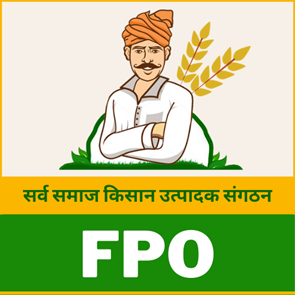
Disclaimer: Copyright infringement not intended.
Context
- Studies show that we need more than one lakh FPOs for a large country like India, while we currently have less than 10,000.
FPO
- FPO stands for Farmer Producer Organization. FPO is an organization, where the members are farmers themselves.
- Farmers Producers Organization provides end-to-end support and services to small farmers and covers technical services, marketing, processing, and other aspects of agriculture inputs.
- Farmer Producer Organization (FPO) is a legal entity incorporated under the Companies Act or Co-operative Societies Act of the concerned States.
- It is formed to leverage collectives through economies of scale in the production and marketing of agricultural and allied sectors.
The idea behind the Farmer Producer Organizations (FPO) was that:
“Farmers, who are the producers of their agriculture products, can form the groups and can register themselves under the Indian Companies Act”.
Implementing Agencies to Form and Promote FPOs
The following three implementing Agencies will form and promote Farmer Producer Organizations
- Small Farmers Agri-business Consortium (SFAC)
- National Cooperative Development Corporation (NCDC)
- National Bank for Agriculture and Rural Development (NABARD)
Note: States may also if so desire, nominate their Implementing Agency in consultation with the Department of Agriculture.
Activities to be undertaken by FPO
FPOs may provide and undertake the following relevant major services and activities for the development:
- The FPO can supply quality production inputslike seed, fertilizer, pesticides at reasonably lower wholesale rates.
- FPO can make available need-based production and post-production machinery and equipment on a custom hiring basisfor members to reduce the unit production cost
- FPO can engage in the process of value addition like cleaning, grading, packing, and also farm-level processing facilities at a user-charge basis on a reasonably cheaper rate.
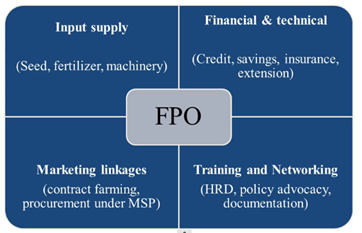
- The FPO can make the facility for storage and transportation for its members
- The FPO must undertake higher income-generating activities like seed production, beekeeping, mushroom cultivation, etc
- FPO needs to undertake aggregation of smaller lots of farmer-members produce; add value to make them more marketable.
- Facilitate logistics servicessuch as storage, transportation, loading/unloading, etc. on a shared cost basis.
- FPO can market the aggregated produce with better negotiation strength to the buyers and in the marketing with better and remunerative prices.
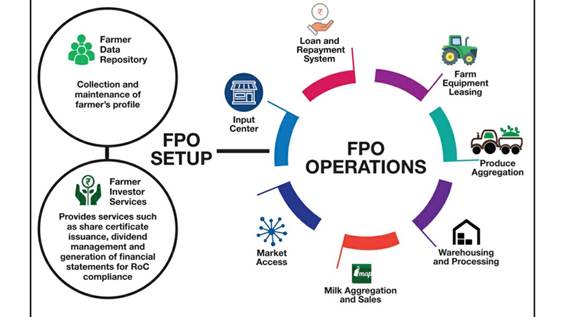
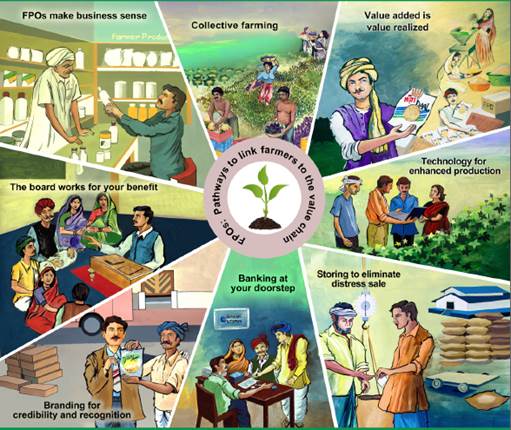
How is the government assisting the FPOs?
To motivate more and more farmers to set up FPOs, the government is providing a lot of assistance:
- Equity Grant Scheme
- Credit Guarantee Fund Scheme through SFAC.
- FPOs can also get help from the government of India for various schemes like marketing assistance, Venture Capital assistance.
- The mission for Integrated Development of Horticulture (MIDH) Scheme. This scheme works towards promoting agricultural business activities.
- The help to farmers is further strengthened by SFAC and NABARD that promote the training of the Board of Directors and their officers of FPOs so that they can function effectively.
- Besides, the Indian Council of Agricultural Research also provided technical support to FPOs via Krishi Vigyan Kendras established in the respective locations. The objective of all these initiatives is to help the farmers and motivate them towards FPOs.

Performance of FPOs
- Experience shows a mixed performance of FPOs in the last decade. Some estimates show that30 percent of these are operating viablywhile 20 per cent are struggling to survive.
- The remaining 50 percent are still in the initial phase of mobilisation and business planning.
- FPOs in Gujarat, Maharashtra and Madhya Pradesh, Rajasthan and some other states have shown encouraging results and have been able to realise higher returns for their produce. For example, tribal women in the Pali district of Rajasthan formed a producer company and they are getting higher prices for custard apples.
- NABARD has undertaken a field study on the benefits of FPOs in Punjab and Madhya Pradesh. The study shows that in nascent FPOs, the proportion of farmer members contributing to FPOs activities is 20-30 per cent while for theemerging and mature FPOs it is higher at about 40-50 percent.
- International Food Policy Research Institute (IFPRI) study reveals that in Maharashtra, some of the FPOs have organically evolved (OFPOs) when farmers have taken the lead to adopt market-oriented practices, develop cost-effective solutions in production and marketing.
- Goa, Gujarat, Maharashtra, and Rajasthan are implementing schemes under which 894 produce clusters have been allocated and 563 FPOs registered, more than 1.35 lakh farmers have been mobilized and about 56,012 farmers have been registered as shareholders of the FPOs.
- 30 women-focused FPOs have been registered. 64 FPOs registered in tribal districts and 85 FPOs registered in aspirational districts.
FPOs are doing better than non-FPO farmers
- IFPRI survey reveals that 98 percent of the respondents for OFPOs report an increase in gross income. In contrast, only 32 per cent of the non-members indicate an increase in gross income These results show that FPOs are doing better than non-FPO farmers. And this substantiates the fact that that we need more than one lakh FPOs for a large country like India, while we currently have less than 10,000.
Issues pertaining to FPOs
Studies of NABARD show that there are some important challenges for building sustainable FPOs.
Some of these are:
- Lack of technical skills,
- Inadequate professional management,
- Weak financials,
- Inadequate access to credit,
- Lack of risk mitigation mechanism and
- Inadequate access to market and infrastructure.
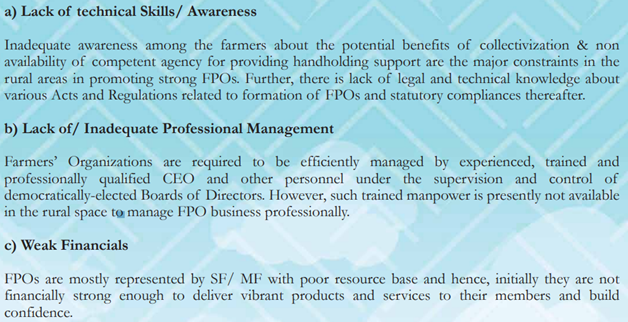
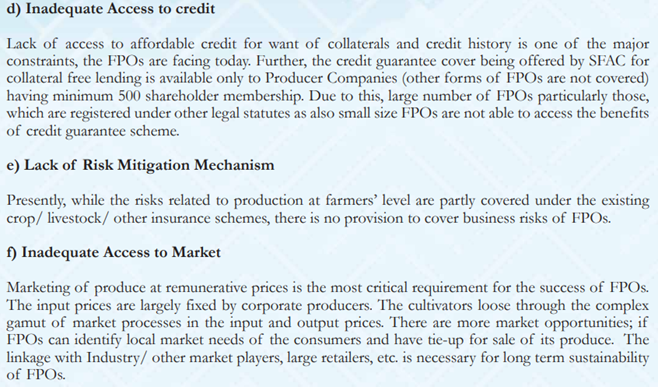
Way Forward
- Issues such as working capital, marketing, infrastructurehave to be addressed while scaling up FPOs.
- Getting credit is the biggest problem. Banks must have structured products for lending to FPOs. These organizations lack professional management and, therefore, need capacity building.
- They have to be linked with input companies, technical service providers, marketing/processing companies, retailers
- They need a lot of data on marketsand prices and other information and competency in information technology.
- FPOs can be used to augment the size of the landby focusing ongrouping contiguous tracts of land as far as possible — they should not be a mere grouping of individuals. Women farmers also can be encouraged to group cultivate for getting better returns. FPOs can also encourage consolidation of holdings.
- In order to build a sustainable FPO, favorable ecosystem is neededbesides certain policy reforms particularly in the agricultural marketing systems. Some of the critical ecosystems include:
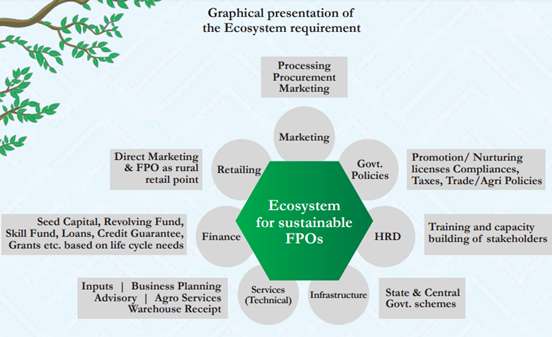
Building of robust FPO movement requires mass awareness creation among farmers/ various other stakeholders and initiating critical reforms to strengthen the FPO ecosystem, as suggested below:-
- Based on National policy of DAC & FW, State Governments may adopt appropriate policy to support, and strengthen FPOs so as to make them self-sustaining and commercially viable business enterprises.
- Strengthening rural agri-marketing infrastructure, promoting unified market for agri produceand enabling FPOs market their produce directly to the consumers/ bulk-buyers, without payment of mandi fee.
- FPOs need to be linked to Gramin Agri Markets (GrAMs) for its operation and management.
- The system of issuing various licenses required for undertaking business activities by FPOs may be simplified to make it a single window state-wide license.
- With a view to increasing farmers’ participation in Agri exports, APEDA may identify suitable clusters of production, processing, and export of potential crops through the FPO route and provide necessary infrastructure & handholding for ensuring consistency in quantity, quality, and traceability of exportable agricultural commodity.
Conclusion
- To conclude, FPO seems to be an important institutional mechanismto organize small and marginal farmers. Aggregation can overcome the constraint of small size.
- The real hope is in farmer producer organizations (FPOs) that allow members to negotiate as a groupand can help small farmers in both input and output markets.
- The FPOs have to be encouraged by policy makers and other stakeholders apart from scaling up throughout the country to benefit particularly the small holders.
- While small farmers gain greater bargaining power through FPOsin relation to the purchase of inputs, obtaining credit and selling the produce, the fundamental problem of the small size of holdings giving only a limited income is not resolved.
- While incomes will rise because of the benefits flowing from FPOs, they may not still be adequate to give a reasonable incometo small and marginal farmers. That issue has to be handled separately.
- Since the FPO has been considered to be the way forward for enhancing farmers’ income and boosting agricultural growth, future strategies for scaling up of FPO promotion by various stakeholders may focus on the following broad areas of critical support/ effective interventions;
- Mass awareness building.
- Institution development.
- Forging linkages with the ecosystem, and
- Digital monitoring.
https://indianexpress.com/article/opinion/columns/nabard-agrarian-distress-farmers-protest-farm-laws-7222830/










